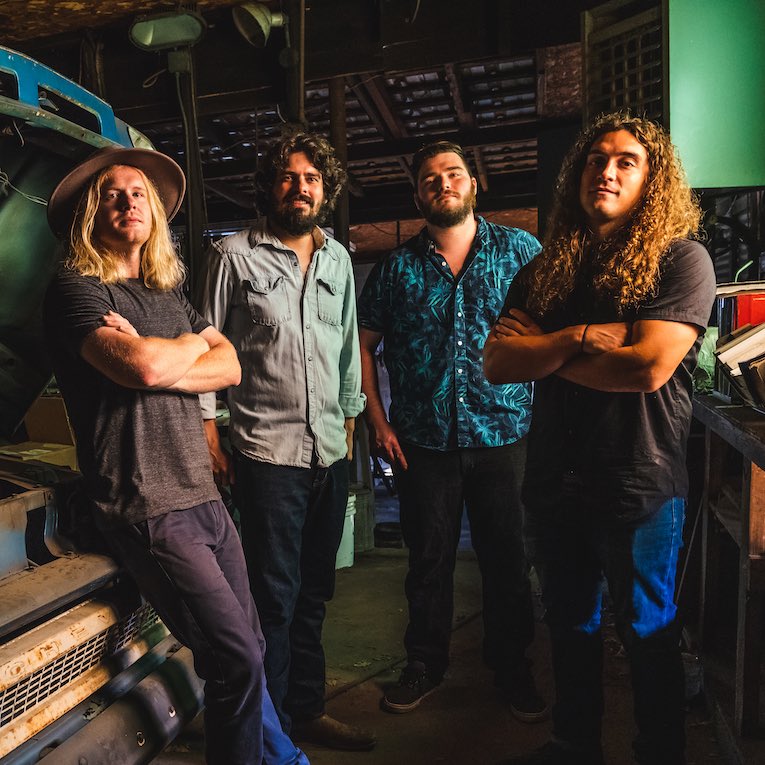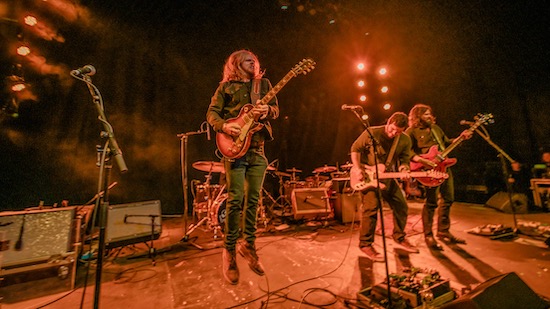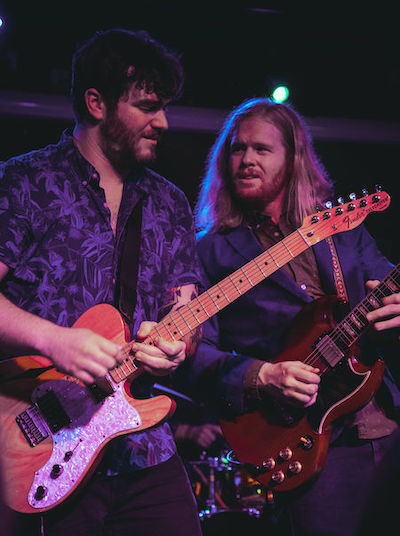
Jive Mother Mary
Jive Mother Mary Plays the Long Odds
By Tom Scarborough
Peering at one another through the aperture of our FaceTime connection, lead guitarist and vocalist, Mason Keck, animatedly describes the history of his band, Jive Mother Mary. It is an ongoing rock and roll odyssey of almost Homeric proportions, an episodic musical journey during which Keck and his band continue to wander between coasts and across oceans. Jive Mother Mary is one of the most engaging bands to emerge from the Second Great Awakening of Southern Rock, and Keck is one of its finest songwriter-front men. In recent years Jive Mother Mary has toured relentlessly, sharing the stage with such artists as Buddy Guy, Leon Russell, Grand Funk Railroad, .38 Special, Foreigner, Blackberry Smoke, The Steel Woods, and the Drive-By Truckers.
Keck lives just southwest of Burlington, North Carolina, in the village of Alamance. Alamance County is a rural piece of ground, seemingly far from anything. Here, the tilled red Carolina clay contrasts sharply with the brilliant green hues of the grass, and the leafy hardwoods covering the gentle contours of this corner of the Piedmont. A sense of this place is woven throughout Keck’s songs and the band’s music. Geography informs their art.
Jive Mother Mary recently returned from a road trip to Montana, where they opened a couple of shows for the Steel Woods and laid down some demos at Glenn Frey’s former studio, in Aspen, Colorado. Now, back in North Carolina, Keck and the band are looking forward to playing a run of dates around the Tar Heel state, something Keck says that the band doesn’t get to do often enough. During its lifespan, Jive Mother Mary has ranged far and wide. “We’ve played 30-35 states, and in several European countries,” said Keck.
Jive Mother Mary—Mason Keck, guitar and vocals; Tyler Schulz, guitar and vocals; Keith Ingalls, bass; Seth “Fluff” Aldridge, drums—first formed in 2006, when the band members were in high school. The band’s name comes from a misconstrued lyric from the song, “Diamond and Debris” by North Carolina band, Cry of Love. Keck grew up steeped in rock and roll music. “I began learning to play the guitar by listening to the radio. The Classic rock station was always on in my dad’s automotive shop—I’d just come over there after school and play guitar to the radio. My dad had played in a Southern rock band called Peach Brandy. He’d grown up in the 1980s, so Tesla was a huge thing around our house. Because of him, I got into Led Zeppelin, Jimi Hendrix and all that stuff. My dad’s band played Southern rock—Allman Brothers, Skynyrd. That’s honestly where I learned to play guitar, watching them rehearse and play.”
Continued Keck, “I was born in 1992, so I don’t remember the New Wave or the Grunge scenes. I’d heard some Soundgarden on the radio when I was young. I was listening to all sorts of stuff When I was 12 or 13—right around when I first met Fluff—I found Southern Harmony and Musical Companion by the Black Crowes. I don’t think you were supposed to be able to wear out a CD, but I swear I wore the cover off three or four copies of that CD. It just fucking rocks so hard.”

Jive Mother Mary
In 2009, while finishing high school, Jive Mother Mary released the first of its five albums, All Fall Down. Populated with straight up bangers like “Move On Home” and laced with psychedelic melodies and precocious musicality, the album was produced by Grammy-nominated North Carolina producer, John Custer. Custer also produced albums by Corrosion of Conformity, Dave Grohl, and the band, Dag. Keck adds, “John had also produced an EP for us in 2007, and we were incredibly fortunate to have him produce All Fall Down. That record still sounds great.”
After graduating from high school, Jive Mother Mary relocated to Los Angeles where the members attended The Musicians Institute. Living together and immersing themselves in the local music scene, the L.A. years strengthened the band musically and interpersonally. Keck also auditioned to play guitar in Slash’s band. “You had to be 21 to get the gig and I was only 19, so I looked at it as a learning experience and hoped I was good enough for them to bend the rules,” laughed Keck.
In 2013, Jive Mother Mary again pulled up stakes and relocated, this time to Athens, Georgia. “In Athens, we rehearsed every day in our house. I think we had several breakthroughs as a band there. That’s where we really began to develop our sound.” Keck and his bandmates remained in Athens for two years before moving back to Alamance County, where they have since remained.
As has been the case for all artists who depend for their living on being able to perform live shows, the past eighteen months have been especially challenging for Jive Mother Mary. “COVID was fucking tough. We just want to play all the time. We’re almost always in the van, playing venues. When we couldn’t do that, it was really hard. We all stayed safe, and we all stayed healthy, so we tried to get together once a week to rehearse. We made it a point to do the live streams. Like everyone else, we just tried to make the best of it. And we ended up recording an album, 8 Tracks.
From the jangly, Gram Parsons-era Byrds influence on ‘Hope It Ain’t That Bad,’ to the honky tonk, whiskey-sodden “Glass Bottles,” to the jackhammer rocker ‘I Can Still Be Your Man,’ 8 Tracks is a musical roadmap of where the band has been, and where it is heading.
Reflected Keck, “8 Tracks is an amalgamation of a lot of things new and previously written. ‘Hope It Ain’t That Bad’ was a relatively new one. ‘Big City Blues’ was a song we had written during the two years we were in Los Angeles, and we were never able to convey it on record the way we wanted to, and we finally got a recording I thought was just right. ‘Don’t Look Now I’m Only Dreaming’ is the first song Schulz and I ever wrote together. But we had never gotten a recording of it we were happy with until now. There’s stuff on that record that spans the last ten years of the band.”
“When I wrote ‘Hope It Ain’t That Bad,’ we had two hurricanes that were supposed to hit back to back. Everyone was worried about the amount of rain we were supposed to get. I had gone to the bank, because you know when shit hits in the South, you’ve gotta get everything buttoned up. I was sitting in the drive through line at the bank to get cash and the line of cars was backed out into the street. I said to myself, “Man, I hope I this ain’t that bad.” I basically wrote the chorus in line at the bank.” Other times, songs take forever—it’s like exorcising a demon.”

Photo: Jive Mother Mary by Fat Frogg
Keck operates in that uneasy space between being a songwriter, and a front man. “The duality of the roles is something that does make us unique, and I’ve embraced it. Luckily everyone in the band is super talented. So, we get to ask ourselves every night we play if we want to go out there as a rock band, or do we do our whole set of stuff that doesn’t rock as hard? My main goal is to figure out a way to have a rock song that is both energetic and has depth.”
Asked to expand on the tension between his roles as front man and songwriter-poet, Keck weighs the question carefully before replying. “The front man is a lost thing in rock and roll. It’s part of a front man’s job to get a crowd rolling and hyped up. You just don’t see that a lot anymore. I kind of toe that weird line. Sometimes half of me wants to be the front man, and the other half of me just wants to be the guitar player in the off light, do the Jimmy Page thing. Our music is rock and roll, but I try to have our lyrics tell a story and carry weight. AC/DC wrote all the good songs about drinking and partying. Kiss wrote all the good songs about sex. So, I do try to tell stories and have our audiences listen to the songs on a deeper level. It’s not an easy thing to balance.”
Keck and I have been talking for well over an hour, but I want to know what he thinks of the current state of rock and roll and, particularly, how he regards the tremendous upwelling of great new bands from the South. It’s a meaty question and Keck chews on it a bit before replying.
“I think rock is very much alive. Like back in the Seventies, today you have all these bands trying to break through at the same time. Southern rock is a weird term for me—it’s more geographic than musical for me. It’s cool to see underground bands like us, Magnolia Bayou, and Otis—just fighting and trying to claw their way up the ladder—it’s cool that there’s a core group of people that support all these bands. There’s a thread of continuity that these people represent that runs through all the bands. They’re the ones who will tell their favorite venues, “Hey, we really like this band, you should book ‘em.” When you have people like that who genuinely love what you do and support the shit out of you, it makes it all worth it.”
Keck is on a roll and I don’t interrupt him. “We’ve been doing this for fifteen years. I feel like the way we do it, it’s more grass roots. The people who come to see us, are THERE to see us. They know our music. They know us. That means so much to me and makes it so worth it. It’s just second nature for us to go into a show thinking it’s going to be like a family reunion and that we’re getting together with a bunch of friends. And, you know, that’s a really cool thing. We want to meet our friends and know them.
It fucked me up last year when I realized Ronnie Van Zant was twenty-nine when he died, which is how old I am—to think what he had already done at that age, or that Duane Allman had done all he did by the time he was twenty-four. I have to keep in mind that everything is different today than it was back then. Rock and roll can be a slow climb these days, but I’m thankful for the lessons we’ve learned along the way and for getting to make rock and roll with my best friends.”
Listen to “Hope It Ain’t That Bad”
For more information about Jive Mother Mary see their website here

Leave A Comment